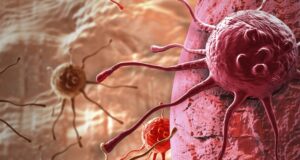
As cancer cells grow, they pump out metabolic byproducts such as lactic acid into the tumor microenvironment. Exhausted T cells -; which have lost their cancer-fighting oomph -; consume this lactic acid, which further saps their energy, according to new research from the University of Pittsburgh and UPMC Hillman Cancer Center.
When the researchers blocked the protein that imports lactic acid into cells, exhausted T cells gained a new lease on life, which led to improved tumor control in mouse models of cancer. The findings are published today in Nature Immunology.
Blocking access to inhibitory metabolites is a completely new take on how we can reinvigorate the immune system. We often think of exhausted T cells being useless, but this study shows that we can actually get juice out of these cells by blocking negative effects of the tumor microenvironment.”
Greg Delgoffe, Ph.D. senior author, professor of immunology at Pitt and director of the Tumor Microenvironment Center at UPMC Hillman
When continually exposed to tumors, T cells progressively become less effective due to expression of coinhibitory receptors that act like brakes. Progenitor exhausted T cells, which still retain some cancer-killing function, can deteriorate further to a terminally exhausted state. Most immunotherapies, including the checkpoint inhibitor drugs anti-PD1 and anti-CTLA4, attempt to release these brakes by blocking coinhibitory receptors.
“Checkpoint inhibitors, which are the main weapons in our immunotherapy arsenal, have been incredibly successful for some patients with certain cancers, but there have also been a lot of failures, and they haven’t been the gamechangers we expected in many cancers,” said Delgoffe. “There’s only so much you can do by taking your foot off the brake.”
On the hunt for new ways to jumpstart tired T cells, Delgoffe and first author Ronal Peralta, Ph.D., postdoctoral fellow in Delgoffe’s lab, started by looking at a family of proteins called solute carriers, which transport nutrients into cells.
“Exhausted T cells have been studied extensively in terms of what they can no longer do,” said Peralta. “But what do exhausted T cells do? What do they eat? What nutrients do they have access to? These questions were the starting point of our study.”
Peralta found that a solute carrier called MCT11, which imports lactic acid, was dramatically increased in terminally exhausted T cells compared to their progenitor versions, suggesting that lactic acid contributes to loss of function.
When he deleted the gene encoding MCT11 in mice or blocked the protein with a monoclonal antibody, T cells ingested less lactic acid and showed improved functionality and tumor control in mouse models of melanoma, colorectal carcinoma and head and neck cancer.
If coinhibitory receptors that lead to T cell exhaustion are the brakes on a car, lactic acid is like poor quality gas contaminated with dirt and particulates that hinders the vehicle’s performance. By blocking access to the gas station that sells this subpar fuel, the car accesses better gas that improves its performance -; just like blocking MCT11 stops T cells from accessing lactic acid that impedes their function.
“When we get rid of MCT11, there’s no difference in the expression of coinhibitory receptors on T cells,” explained Delgoffe. “They’re still technically exhausted, but they behave as functional T cells because we cut off the tap of this bad metabolite, lactic acid.”
The researchers found that the MCT11 antibody promoted clearance of tumors in mice when given alone, but it was even more effective when combined with anti-PD1.
Through their new spinout company, Delgoffe and Peralta are now working to optimize the MCT antibody for effectiveness in human T cells, with the goal of testing it in future clinical trials.
According to Peralta, MCT11 is an attractive therapeutic target because it is almost exclusively expressed in exhausted T cells, which are concentrated in tumors. This means that drugs targeting MCT11 could have fewer side effects than traditional immunotherapies such as anti-PD-1, which act on T cells throughout the body.
“This research is really exciting because it’s proof-of-concept that targeting how T cells interact with metabolites in their environment can promote better outcomes in cancer,” said Peralta. “It opens the door for exploring how we can go after other targets in immune cells for treating cancer and many other diseases.”
Other authors on the study were Bingxian Xie, Ph.D., Konstantinos Lontos, M.D., Ph.D., Hector Nieves-Rosado, Ph.D., Kellie Spahr, Supriya Joshi, Ph.D., Rhodes B. Ford, Kevin Quann, M.D., Ph.D., Andrew Frisch, Victoria Dean, Mary Philbin, Anthony R. Cillo, Ph.D., Sebastian Gingras, Ph.D., Amanda C. Poholek, Ph.D., Lawrence P. Kane, Ph.D., and Dayana B. Rivadeneira, Ph.D., all of Pitt and UPMC.
This research was supported by the National Institutes of Health (DP2AI136598, P50CA121973 and P50CA097190), the National Institute of Allergy and Infectious Disease (R01AI171483, R01AI166598), the Hillman Fellows for Innovative Cancer Research Program, Stand Up to Cancer (SU2C-AACR-IRG-04-16), the Alliance for Cancer Gene Therapy, the Mark Foundation for Cancer Research’s Emerging Leader Award, a Cancer Research Institute Lloyd J. Old STAR Award and the Sy Holzer Endowed Immunotherapy Fund.
Source:
Journal reference:
Peralta, R. M., et al. (2024). Dysfunction of exhausted T cells is enforced by MCT11-mediated lactate metabolism. Nature Immunology. doi.org/10.1038/s41590-024-01999-3.




